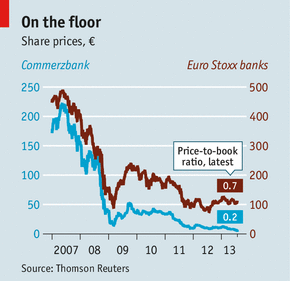(单词翻译:单击)
Commerzbank
德国商业银行
Das slog
步履维艰
The second-biggest bank in Europe's strongest economy still faces an uphill task
欧洲最强经济体的第二大银行仍然面对提高业绩任务。
Jul 27th 2013 | Berlin |From the print edition

COMMERZBANK'S marketing materials show a woman running in a grey, hooded jumper, headphones in her ears. Her eyes are locked on the path ahead in determination to finish her workout. This is probably meant to flatter the bank's customers as gritty and hard-working. But it is a better metaphor for the bank itself. It is on a long, hard road back to health, a journey that exemplifies the painful reshaping of Europe's troubled banking system to be smaller, safer and more domestic.
德国商业银行的营销材料上画着一名女子,身穿灰色衣服跑步,带着连衣帽,耳朵里塞着耳机。眼神坚毅,死死盯着前方的路,志在完成自己的锻炼计划。这可能是在讨好自己的客户,暗指他们都是坚韧不拔,工作勤奋。但是这个隐喻或许更贴合银行自身的实际。德国商业银行离回到良性发展还有很长的路。这是欧洲陷入危机的银行体系转向更小,更安全和更本土化的痛苦转型的很好的例证。
Commerzbank's initial trajectory through the crisis resembles that of another European lender, Britain's Lloyds Banking Group (LBG). Like LBG, it was a big bank but not the biggest in the country—Deutsche Bank is Germany's colossus. Like Lloyds, it undertook a disastrous domestic transaction at the worst possible time, buying Dresdner Bank in the summer of 2008 just weeks before LBG gobbled up HBOS. And like the British bank, it quickly ended up tapping state coffers to survive.
德国商业银行度过危机的初始轨迹很想另一家欧洲银行,英国的劳埃德斯银行集团。跟劳埃德斯一样,德国商业银行是本国的一家大型银行,但却不是最大的,德国最大的银行是德意志银行。德国商业银行同样经历了一次灾难性的国内收购。它在2008年夏天买下了德累斯顿银行,这是在劳埃德斯吞并苏格兰哈利法斯克银行几周之后。同样的,很快以向国库求救自保结束。
The parallels between the two are less obvious now. LBG's shares have risen by 33% in the past three months, and by 133% in the past year. The bank's share price hovers just below the price the British government paid to buy its 39% stake, which will soon be sold. Things look far less fizzy at Commerzbank. At the time of the rescue deal the bank's boss, Martin Blessing, declared that state ownership should last a maximum of 36 months. More than four years on, its shares still lag the broader index of European banks; its price-to-book ratio is one of the lowest on the continent (see chart). Its 2012 net profit came in at a mere 6m euros(7.7m dollars).

两者现在的处境有所不同。劳埃德斯的股价在过去的三个月中上涨了33%,在去年上涨了133%。该银行的股价稍稍低于英国政府购买其39%股份时的价格,英国政府很快就会将这笔股份卖掉。德国商业银行的处境则要惨得多。德国政府救助与其交易的时候,银行老板Martin Blessing说,国有权最多持续36个月。而现在,四年过去了,其股价仍旧低于欧洲银行的大盘指数。其市净率在欧洲处于最低水平。而在2012年的净利润也只有600万欧(770万美元)。
Rumours that the German government might sell its 17% stake to a foreign bank were scotched this week. Newspapers speculate whether the bank might exit the DAX, the country's benchmark stockmarket index, leaving Deutsche as the only member bank. Deutsche itself still labours to plump up its own thin capital cushion.
本周,德国政府出售其控股的17%给一家外国银行的谣言四起。媒体纷纷推测德国商业银行会不会退出德国DAX指数,这样该指数就只剩德意志银行一家银行股了。德意志银行也忙着增加其缓冲资金。
Commerzbank can point to several forces beyond its control. The euro-zone crisis weighs heavily. The restructuring of Greek government debt handed it a big loss. Historically low interest rates have depressed income. Competition from Germany's many small savings banks and co-operatives puts pressure on fees; online banks are adding to the pressure. A downturn in shipbuilding has hit Commerzbank's big portfolio of loans in that industry. The Basel 3 rules have prompted the bank to retain capital rather than dole it out to shareholders. (The bank estimates that its Tier-1 core capital ratio under Basel 3 is 8.4% after a May capital-raising.)
德国商业银行能将原因归咎于几个它无法控制的因素。欧元区危机无疑是最大的因素。希腊政府债务重组给其造成了重大损失。史上最低的利率也减少了其收入。来自德国的许多小型储蓄银行的竞争也使其降低自身费用,网上银行也增加了其压力。造船业的衰退也使得其在造船业德组合贷款业务受到沉重打击。巴塞尔3资本规定使得德国商业银行只能保留资本,而不能发放给股东。(银行估计,在巴塞尔3规定下,其一级核心资本比率在五月融资之后达到8.4%)
For one bank to have had so much bad luck prompts the question of just how much carelessness, not misfortune, is to blame. Like many European banks, both Commerzbank and Dresdner invested in subprime-mortgage-backed assets before the crisis. And like many of its continental peers, the bank was also a big international lender against chunky assets in areas like shipping, aviation and property. About a quarter of its 18.3 billion euros shipping portfolio is non-performing; it is expected to take a charge against lending in Detroit when it next reports results.
对于一家银行来说,这么多倒霉事儿遇到一起,只能怪其太粗心,而不能说太不幸了。跟许多其他欧洲银行一样,德国商业银行和德累斯顿银行在危机之前都投资了次贷资产。这个银行也借贷给船舶业,航空业和房地产业。其在船舶业投资达183亿欧,其中有四分之一毫无收益,等下次报告出来该行有可能向底特律的借贷提起指控。
Analysts want Commerzbank to keep shedding these “non-core” assets, which stood at 151 billion euros at the end of 2012. Some are easier to offload than others. Holdings of peripheral euro-zone government bonds can be gently unwound by letting them run off. But shipping and property loans are longer-term and less liquid, which is why they are now being treated more harshly under the Basel 3 rules. Commerzbank did this month at last manage to sell the British operations of EuroHypo, its commercial-property arm.
分析员希望德国商业银行能放弃非核心资产,这些在2012年底占到1510亿欧。有些很容易脱手。所持欧元区其他国家政府的债券会轻微受损。但是船舶业和房地产业的贷款是长期的,流动性也差,这也是在巴塞尔3规则下更严厉的原因。德国商业银行这个月末最终准备卖掉欧洲抵押银行的英国公司,其商业地产分支。
As Commerzbank slims down these parts of its balance-sheet, a more Germanic lender is slowly emerging. The strategy is plausible. The combination with Dresdner gave Commerzbank an enviably big retail-branch network and customer base in Europe's strongest economy. The Mittelstandsbank, the division lending to Germany's small and medium-sized, mostly family-owned businesses, is in decent health: 30% of Mittelstand companies are customers, and the pre-tax return on equity in this unit was 28.6% in 2012, against 3.1% for the group overall. As these firms go into global markets, where savings banks cannot follow, Commerzbank has a shot at boosting its business with them. Expansion in Poland looks sensible.
随着德国商业银行将这些从资产负债表中除去,一个更德国的借贷者出现了。这个战略看起来是有效的。跟德累斯顿银行的合并会使得德国商业银行在欧洲最强经济体拥有一个令人羡慕的大型零售网络和顾客基础。中小企业银行掌管德国的中小企业贷款业务,这些中小企业中很多都是家族企业,2012年,这一业务的税前回报为28.6%,整体业务只有3.1%的回报。随着这些企业的国际化,储蓄银行就无能为力了。德国商业银行有意拓展跟他们的业务。在波兰的扩张看起来很有用。
Yet the bank is still some way from turning this vision into reality. A banking consultant quips that the maths of the Dresdner deal amount to “one plus one equals one”. And a domestic focus has its downsides. Fierce local competition from the savings banks and co-operatives will not go away. Nor will the drag from the euro zone's economic prospects: interest rates will remain low as long as inflation stays subdued.
然而,德国商业银行还是应该回到现实。一个银行业顾问指出,这次的德累斯顿交易是一次亏本买卖。国内的重点业务呈下降趋势。来自储蓄银行的激烈的本地竞争不会停止。欧元区的经济预期是只要通货膨胀得到抑制,利率将会持续走低。这也会拖累银行复兴。
So Mr Blessing and his team have little choice but to concentrate on the nuts and bolts. That includes making more cuts in branches and staff (branches have already fallen from about 1,500 to 1,200), controlling their tempo so that the bank can reap savings without battering its franchise. One part of this is greater flexibility in the offerings at each branch. Not every location needs an expert in everything; more advice can be given online or over the phone. Another is growth in its online division, comdirect. Commerzbank has the scale to build a sophisticated offering; savings banks and co-operatives may not.
因此,Blessing先生跟他的团队没有多大选择,只能是集中精力做好细节工作。包括减少分支机构,裁员(分支机构已经从1500个减少到1200个了),控制好节奏,只有这样银行才能从存款中获利,并且不影响其经营。这在各分支有很大的灵活性。不是每个地方都需要专家,可以通过电话或者网络提供建议。还有一个是网上分支的增加。德国商业银行能提供各种复杂的服务,但是储蓄银行则不能。
Such strengths should eventually return Commerzbank to fitness. But the miserable share price suggests that investors expect a period of plodding before it is back to running at full tilt.
这些措施应该最终能使得德国商业银行回到正轨。但是其可怜的股价意味着投资者期望其走出困境之前有一段时间的辛勤工作。


